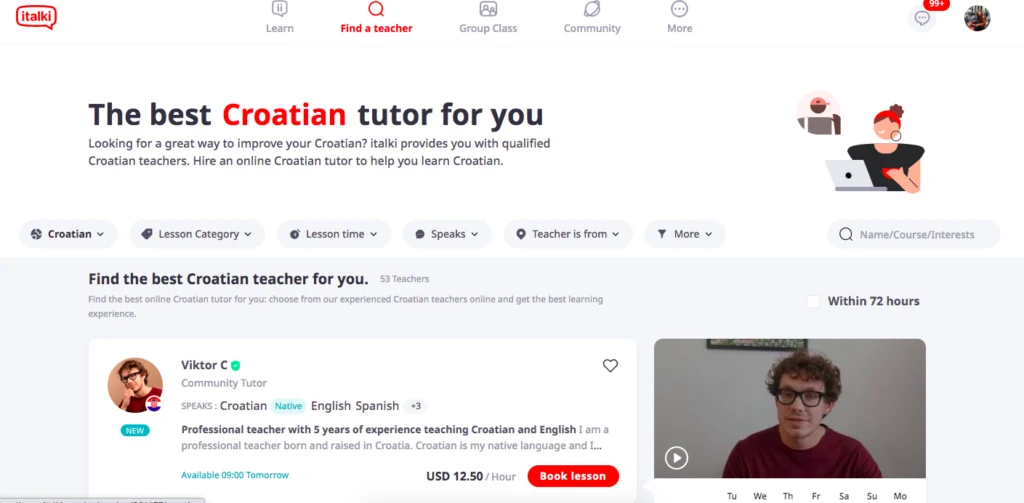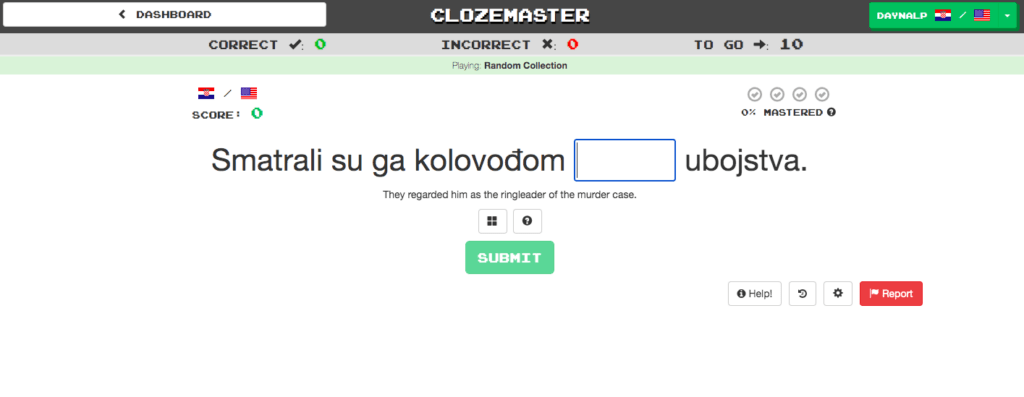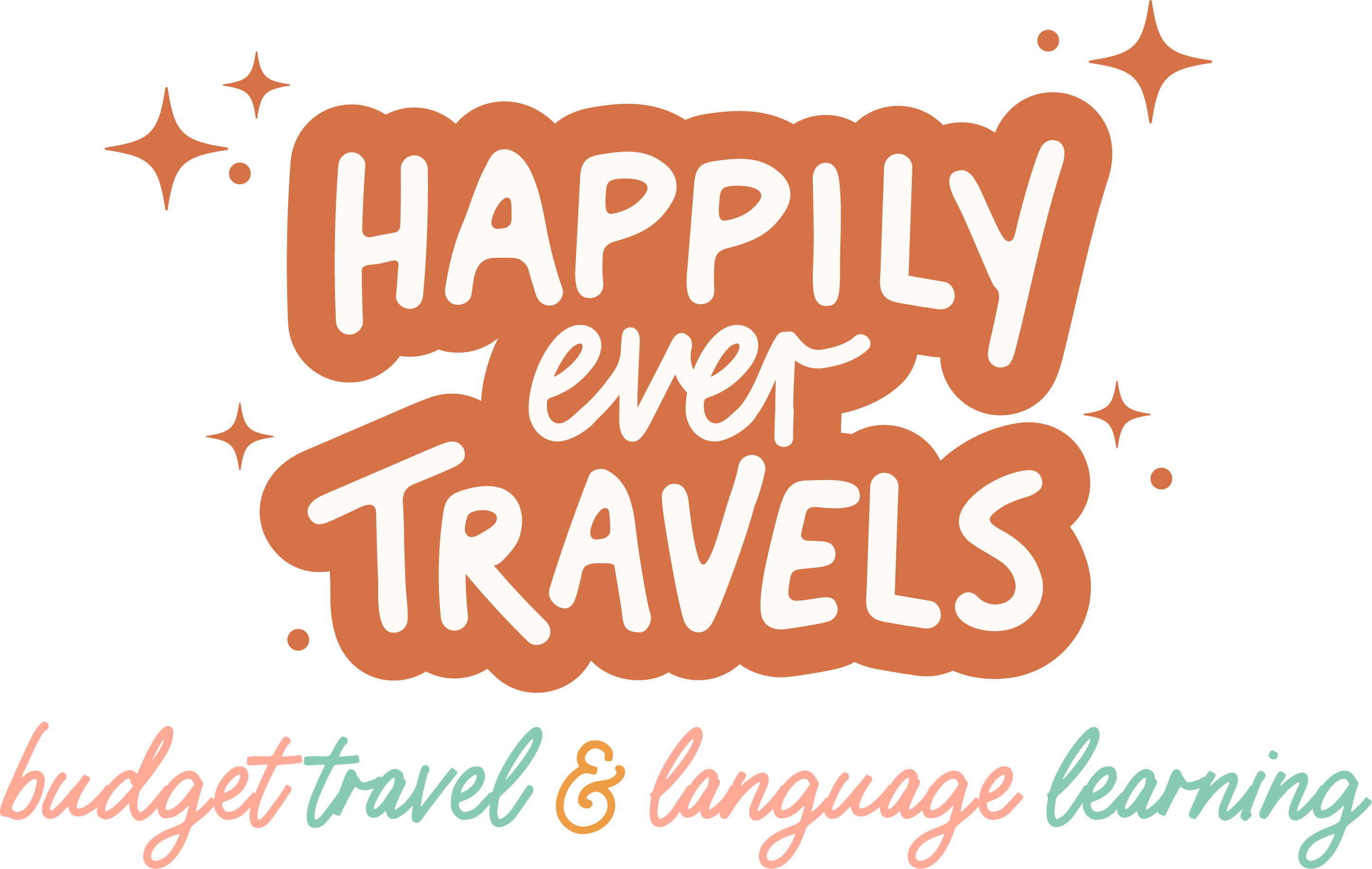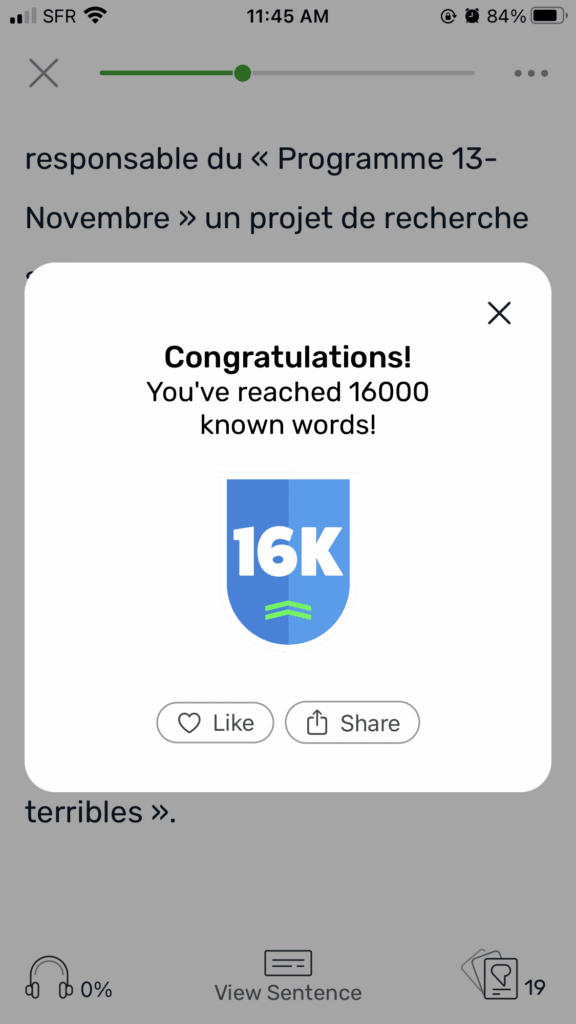With historic roots, stunning coastlines, and cuisine that’s to die for, it’s no wonder that tourists and expats are flocking to the beautiful nation of Croatia and are starting to want to learn Croatian. So what apps can you use to learn Croatian, and which is the best one for you?
11 Effective Apps to Learn Croatian
Given how Duolingo has let us down when it comes to Croatian and other Slavic languages, we need to find alternatives. So what apps are available to learn Croatian and what are the selling points of each one?
1. Mondly
If you’re looking for a language app that’s pretty similar to Duolingo, you might want to check out Mondly. This particular app uses gamification to make learning Croatian fun and keep you coming back time and time again.

You can brush up on your Croatian with new lessons every day, and a weekly quiz to help test out your skills and see where you’re at.
There are a few different lesson styles in the Mondly app including native speaker audio recordings, flashcards, and written conversation practice. This helps you improve a wide range of Croatian skills, including listening tools that are often overlooked by language apps.
2. Memrise
Okay, it’s worth mentioning up top that Memrise isn’t specifically a language-learning app. Nevertheless, it is really useful for learning Croatian. Memrise is a revision-style app where users can create and share learning resources.
As it’s user-generated, there are a lot of Slavic language resources, specifically in Croatian.
From quizzes to media that’s in Croatian to slideshows and worksheets, there’s a bit of something no matter what your preferred learning style might be.
Although it’s not a set Croatian language course, there are plenty of ways to improve your skills alongside other more traditional language learning methods or apps.
3. iTalki
As I’ve kind of spoken about already, one of the best ways to learn any language is through a one-to-one native tutor. Croatian language tutors are pretty rare in a lot of the world, so you might struggle to find one in person.
That’s where iTalki comes in. It’s essentially an app that connects language tutors with students all over the world.

Scroll through the list of Croatian language tutors, filtering by rating, price, time zone, and more to find your ideal match. Once you’ve found a tutor that ticks all your boxes, you can set up video lessons in real time.
This way you can have lessons that are personalized to your level and your individual Croatian language goals.
Additionally, you can be corrected in real-time and work on your pronunciation skills. This is something that’s really difficult to do if you’re not actually in the country or surrounded by native speakers, so it’s a huge plus.
A lot of apps can’t really focus on speaking and listening skills, and if you’re visiting Croatia, these are probably the language skills that you’re going to use the most.
4. FunEasyLearn
If you’re looking for a relatively simple way to learn Croatian vocabulary and phrases from a beginner level, check out FunEasyLearn. It’s been developed to include over 15,000 Croatian words and phrases, so it’s going to give you a really good foundation to build your language skills.
Primarily in a flashcard format, FunEasyLearn is ideal for brushing up on your Croatian on the go, or if you’re short on time. If you’re about to leave the house but have a spare five minutes, you can easily whip out this app and get your Croatian fix.
There are also a lot of illustrations and topic-based lessons which really help with context and understanding when these words and phrases might come in handy.
5. Drops
Similar to FunEasyLearn, Drops focuses on building up your vocabulary skills in a simple and interactive way. Drops is designed in a really aesthetically pleasing way which makes you want to keep coming back.
It doesn’t feel like a kiddy flashcard app with illustrations, instead uses sleek icons and text to make the whole process feel more fine-tuned.
On the free version of Drops, you can enjoy five minutes a day of Croatian vocabulary practice, which becomes unlimited on the paid version.
However, with just five minutes a day, you’ll be surprised at just how much you learn and retain. As long as you’re consistently using Drops, you’ll be a walking-talking Croatian dictionary in no time!
6. Pimsleur
If you want to focus more on your speaking and listening skills but don’t want to fork out for a tutor, try Pimsleur. Created in line with a scientifically proven method for language learning, Pimsleur is made up of 30-minute audio lessons, designed to give you real-world Croatian experience.
Critically, the app focuses on situations that you’re actually likely to find yourself in. A lot of vocabulary-based apps and language learning programs start by teaching you all the animals and all the colors when really you’re unlikely to need that piece of knowledge straight off the bat.
Now, checking into a hotel or asking for directions – those are words and phrases that are going to come in useful!
Pimsleur definitely takes a more practical approach to learning Croatian, so if you want to dive straight in and start speaking Croatian on day one, it’s well worth giving it a go.
7. Ling
Another language learning app that is similar to Duolingo is Ling. It even has an animal for a mascot and a ton of gamification that helps make learning more fun.
In addition to a ton of flashcard lessons and quizzes, you’ll also have access to audio lessons that have been recorded by native Croatian speakers.
Another cool feature of Ling that separates it from other language-learning apps is the chatbot feature. You can pick a chatbot with a particular topic and start speaking to them. The AI in the app will correct you in real time, giving you updates on pronunciation, spelling, and more.
There are a lot of missing word style lessons as well, where you’ll listen to a full conversation and then fill in the gaps. It helps hone your listening and reading skills simultaneously which is super interesting.
8. Mango Languages
Want to learn about Croatian grammar and culture as well as improve your four language skills and vocabulary? That’s what Mango Languages sets out to achieve.
In addition to the fairly standard flashcards and quizzes that help to build our Croatian vocabulary, you’ll also find audio lessons that have been recorded by native speakers.
In between the different lessons and activities, Mango Languages provides insight into the many different Croatian grammar rules, allowing you to more fully understand how the language works, rather than just repeating words and phrases over and over again.
Another cool feature that Mango Languages has used is the cultural tips and insights that pop up at regular intervals.
If you’re a language, the cultural differences and conventions are going to have a big impact on the formality you use, when you use certain phrases, and help you to understand Croatian more fully.
9. Simply Learn Croatian
Sometimes you don’t want to carry around a physical phrasebook when you’re traveling around Croatia. Also, it can feel a bit awkward to whip out a book mid-conversation if you can’t remember a word or phrase. With Simply Learn Croatian, you can have an easy-to-navigate phrasebook on your phone.
With the words and phrases split up by category, it’s easy to find what you’re looking for in a pinch, and you can take a whole host of quizzes and flashcard lessons to help improve your knowledge.
Honestly, this is more of a revision or support tool, rather than a Croatian learning program, so you might want to use it alongside another app or method.
10. LingQ
This is one of my favorite apps on this list, however, I don’t necessarily think it’s great for beginners which is why it’s so far down in the list. LingQ is all about input, reading and watching in your target language, and keeping track of those words.
It’s the best way to measure how many words you are learning in real-life contexts like reading the news or watching Netflix. So if you are an advanced beginner or above, this app is the best!
11. Clozemaster
If you’re looking for something a little more advanced to move onto, consider using Clozemaster. It’s essentially the next step for building up your bank of Croatian words and phrases.
Clozemaster takes a half-gamified and half-scientific approach to language learning which complement each other pretty well.

The best thing about Clozemaster is that it teaches you all these advanced words and phrases in context. You learn exactly when, why, and how you’d use these pieces of vocabulary, rather than having a load of random Croatian words in isolation. It makes the whole app feel more cohesive and practical.
Why Should You Learn Croatian?
Apart from it being a wonderful language, the number of people living and vacationing in Croatia is growing. It’s fast becoming the destination for summer holidays and with waterfalls, beaches, islands, mountains, and historic cities, there’s a little something for everyone.
When you’re visiting a place, it’s always good to learn a few words and phrases in their native language to get by and show respect.
Also, Croatia is expected to be a big player in the European digital nomad space, thanks to its location and weather.
As a US citizen, you can already stay there for 90 days out of 180 days without a visa, so if you’re looking to live overseas in Croatia, you’ll need to brush up on your Croatian.
Is Croatian Hard to Learn?
Yes, Croatian is pretty hard to learn.
If you don’t have any experience with Slavic languages, then chances are that you’re going to find Croatian pretty difficult to learn.
There are three genders, seven cases, and some super complicated tenses to contend with.
It shouldn’t put you off trying though, as Croatian is similar to a lot of other Slavic languages, once you find your way around one, the others will quickly follow.
That means you’ll be getting more language learning for your time and effort!
What Languages are Similar to Croatian?
In terms of similar languages to Croatian, there are quite a few. Bosnian and Serbian are both very close, with many people saying you can speak Croatian and Serbian interchangeably in either country and be understood.
A lot of the countries within the Balkan region are closely related, with some of them being in the same country way back when there were a ton of similarities.
So, if you’re traveling around the area and know Croatian, you might find yourself being able to easily pick up other Slavic languages, or recognize odd words and phrases.
What’s the Best Way to Learn Croatian?
Like any language, the best way to learn Croatian is through immersion or with a Croatian tutor on a one-on-one basis. Historically, these are the most effective ways to learn a language.
The base theory is that if you have to use a language every day because you’re in that country, you’re going to pick up more words, phrases, and skills through necessity.
As not all of us can spend time living in Croatia, absorbing this wonderful language, the next best way is to have one-to-one lessons with a native Croatian speaker, or qualified tutor.
These obviously can cost quite a lot depending on where you are and your experience level, so it’s not always a viable option, but it’s much cheaper than moving to Croatia.
Does Duolingo Have a Croatian Course?
Unfortunately, the mighty Owl doesn’t have a Croatian course, nor are there any plans to add one any time soon. If you’re hoping to learn Serbian or Bosnian instead as a gateway language, Duolingo also doesn’t have either of these courses available.
Why? We’re not sure. There’s certainly demand for at least one of these languages, if not all three.
After all, Duolingo has Klingon and High Valyrian on the app but doesn’t have these widely used, real-life languages. It doesn’t add up.
How Long Does it Take to Learn Croatian?
You can’t learn a language overnight, and with a difficult language like Croatian, it might take longer than you might think.
For a complete beginner to get to a conversational level of B1, it’s estimated that it’ll take around 400 hours of learning so you’re looking around two years to get comfortable with the various genders, tenses, and cases.
Of course, if you’re already familiar with other Slavic languages, you’re likely to pick up Croatian at a much quicker rate. It’s similar to learning Italian once you know Spanish – there are a lot of similarities that make picking up a new language a lot easier and quicker.
Download One of These Apps & Start Learning Croatian!
So, even though Duolingo has let us down when it comes to learning Croatian, there are a whole host of other amazing apps that you can use to help you learn Croatian.
From one-to-one tutor portals to gamification apps to vocabulary-building flashcards, it’s all out there.
The great thing is that the vast majority of the language learning apps on this list have a free version that you can try out before committing to the full version.
You can also use these apps alongside more traditional language learning methods like books, videos, audio, or in-person conversational practice.
Everyone learns in different ways, so use whatever helps you to gain the Croatian skills you need. Whether that’s going old school with tutors, mixing a couple of different approaches, or just trying to get a handle on vocabulary to start with.
Croatia is a beautiful country with a strong culture, history, and language, so why not pick one or two of the apps and start learning Croatian today?
Read More About Language Learning:
- Sing Happy Birthday in Croatian!
- Apps to Help You Learn Tagalog Quickly
- How to Delete a Whole Language Course on Duolingo
- Learn How to Sing the Happy Birthday Song in Scottish Gaelic
- Is There a Slovak Course on Duolingo?

Dayna Brockbank is a travel and language-learning blogger who has lived around the world but has now settled in Nice, France. She speaks 3 languages at varying levels of fluency: Spanish, Italian, and French, and graduated with a Bachelor’s in Spanish Education. She and her husband focus on making travel part of life by living cheaply and traveling on a budget.


Steve
Tuesday 29th of November 2022
You are amazing! I love reading your blog!